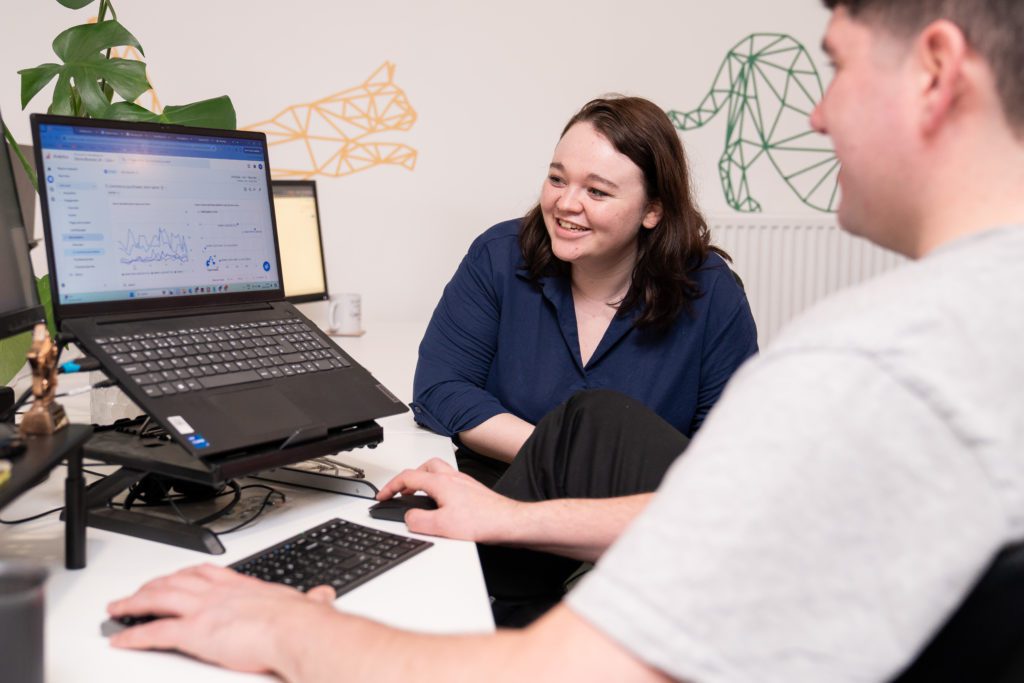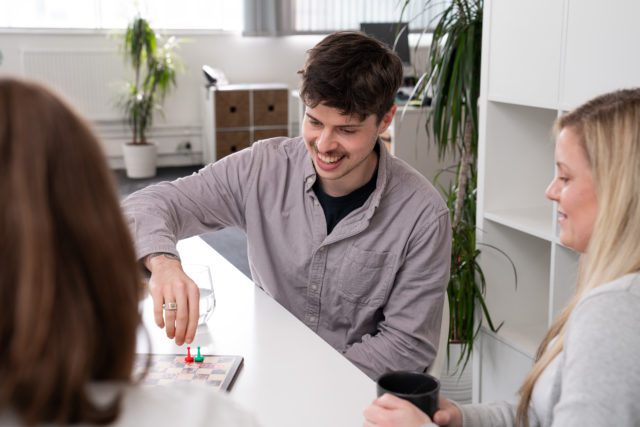In the fast-paced world of digital marketing, optimising existing content can often be more cost-effective than creating new content. But, the task is often overlooked by business owners and SEOs alike. So, let’s take a look, is blog optimisation really worth your time?
Yes, optimising blog content is absolutely worth it. It often yields quicker and sometimes instantaneous SEO results compared to writing new blog content. Sometimes a blog just needs a few quick tweaks (a better structure, improved internal/external linking, and updated stats) in order to garner great results – so it is something you can do on a tight budget.
Read on to learn how to determine which existing blogs you should optimise vs which aren’t worth it, as well as how often they should be updated, and the benefits of optimising old content.

Blog optimisation is a task that is often overlooked by many business owners – but it can be the difference of hundreds if not thousands of visitors to your website. Here are just some of the benefits of blog optimisation:
Our client, yoursexualhealth.co.uk, is a market leader in private sexual health testing. Their SEO strategy relies heavily on their blog strategy, which helps them to attract new users across the UK and solidify themselves as experts within the industry.
In the example below, we optimised a blog that was a few years old, but had recently seen a dip in traffic. Now, this content didn’t perform badly as such. At its peak (before optimising), it gained around 140 clicks a day, which had dropped to about 80 clicks a day – still plenty of traffic, but we can do better!
We spent time optimising the blog, implementing:
We saw an instant spike in results. Now the blog averages around 750 clicks per day and is one of the best-performing blogs on the site. For a task that took less than an hour – I think that is pretty good going!
There are a few easy methods you can use to determine which blogs are worth updating and optimising. We explore them in more detail below:
Looking at content that has shown a decay over recent months or years is one of my favourite ways to choose which blogs to optimise – and it’s seen me the most results too! The main sign of decayed content is articles that were once popular but have seen a dip in traffic. This doesn’t mean a dip month-on-month (this doesn’t account for seasonal trends), but rather year-on-year, or over the past few years.
Content that once brought in a lot of traffic shows that there is search volume associated with that topic, but that potentially the blog lacks freshness (which Google loves!). Decayed content often only needs updated stats, updated links, and a re-optimised structure to rank well again.
Blogs ranking on pages 2 or 3 for targeted keywords have high optimisation potential and may just need a little extra content or E-E-A-T optimisation to reach the top of the results. However, this method has its downfalls.
Often, blogs with rankings on page 2 or 3 may not have been given enough time to reach the first page of the search results. On average, it can take a blog 6-12 months to rank at all, let alone in the top few positions, so it is best to let the content do its thing before spending time optimising it. It is only worth optimising blogs hovering around the mid-rankings if they are older than a year.
Another crucial indicator for blog optimisation is outdated content. As the blog owner, you’re likely to have a good idea of old posts that won’t be that relevant any more. They might reference old statistics, expired trends, or obsolete technologies that can make your post lose credibility and relevance, both in the eyes of readers and search engines.
If your content is based on information that is no longer valid, updating these elements can make a significant difference in performance. Replace outdated stats with the most recent data, swap old tools or technologies with the latest alternatives, and ensure that any changes in industry practices are reflected in the post.
Staying competitive in your industry means keeping a close eye on what others are doing. If your competitors have recently updated similar blogs that have gained traction, this could be a sign that you should revisit your content on the same topic.
Analyse what changes they’ve made; whether it’s expanding content, incorporating new keywords, or adding new links and use that as a guide to optimise your own post. Even if your blog is performing decently, competitor improvements can affect your rankings (they could end up above you!), so it’s important to stay ahead by regularly reviewing industry content.

Whilst optimising most blogs will most likely see some form of SEO gain, this isn’t the case for every single bit of content on your site. Sometimes, reviewing and updating a blog can be a complete waste of time. Here are a few of the things to consider when deciding which blogs aren’t worth optimising:
As with many things in SEO, there is no hard-and-fast rule when it comes to how regularly you should update your blog content. It will completely depend on how new your site is, how much content you have on there, the topics of said content, and how much time you have to spend on it.
However, as a general rule, I like to plan my content strategies around something called a ‘content cocktail’. For every 3 new blogs I write, I optimise 1 older post. To learn more about how often you should update old content on your website, read our helpful blog: How Do I Refresh Old Content For SEO?
Once you’ve audited your existing content and decided which blogs would be worth optimising, then comes the hard bit! Here’s a quick guide on how to optimise your old content:
For a comprehensive step-by-step guide on optimising your blogs, read our helpful article: How Do You Optimise a Blog for SEO?

Ready to breathe life into your old blog content but aren’t sure where to start? We have a team of content specialists ready to guide you in the right direction. At Wildcat Digital, we offer bespoke SEO services, built to help you punch above your weight online. Get in touch with us today for a free initial consultation.

Founder
Our founder, Will Hitchmough, worked at a number of high profile Sheffield Digital Agencies before founding Wildcat Digital in 2018. He brings an extensive knowledge of all things related to SEO, PPC and Paid Social, as well as an expert knowledge of digital strategy.
Digital Marketing can be a minefield for many businesses, with many agencies ready to take your money without knowing how to deliver results. I founded Wildcat Digital to deliver digital success to businesses with smaller budgets in a transparent way.

Head of Growth
Rich joined us in May 2024 to head up our growth team. With years of experience helping other agencies to grow, Rich joins us at an exciting time as Wildcat is working on a five-year plan to become one of the biggest agencies in the UK.
Outside of work, Rich is a father to three children, which keeps him very busy! He’s also recently started running again to keep fit and loves a bit of DIY.

Head of Digital
Sarah joined Wildcat in January 2025, bringing over seven years of SEO expertise to the team. With a background in Fashion Communication and Promotion, she has worked both in-house and at agencies, covering a range of digital marketing specialisms before focusing on SEO.
Passionate about all things search, Sarah thrives on helping brands grow their online presence.
Outside of work, she enjoys walking her dog, running, and shopping for vintage clothing.

Office Manager
Amelia joined Wildcat Digital in January 2025, bringing extensive experience in HR, Health & Safety, Facilities Management and IT Support. Previously an Operations Manager at The University of Sheffield, she has a strong background in creating efficient and well-organized work environments.
Specialising in HR, Health & Safety, and Facilities Management, Amelia ensures the Wildcat Digital team has the resources and support needed to thrive. Whether managing office operations, maintaining compliance, or fostering a positive workplace culture, she keeps everything running smoothly.
Outside of work, Amelia loves trying new things, traveling, camping, and walking. She also enjoys socialising and exploring new places with friends and family. Her adventurous spirit and proactive approach make her a valued member of the team.

Client Success Coordinator
Siena joined us in 2023 with a background in sales and digital marketing. She leads on client relationships across the company, ensuring that our customers are happy throughout their journey with us, from their initial consultation through to onboarding and beyond.
Outside of work, Siena enjoys travelling and getting stuck into the local culture. She likes to make the most of her experiences and particularly enjoys watching sunrises and sunsets from beautiful locations around the world.

SEO Account Director
Paul has a strong background in SEO, having previously founded and ran a successful eCommerce business, as well as running a personal blog that achieves an average of 17K users per month. Paul’s knowledge of SEO is extensive, with a strong emphasis on client handling and technical SEO.
Outside of work, Paul enjoys spending time with his family and staying active with weight lifting and combat sports.

Team Lead & Technical SEO Account Manager
With a degree in Computer Science and SEO experience dating back to 2017, Dariusz has a wide range of SEO skills and knowledge. His specialist knowledge of Technical SEO has firmly landed him the title of Wildcat’s Technical Wizard, and he has recently taken on the responsibility of Team Leader for the Panthers Team.
In his spare time, Dariusz loves hiking, experimenting and trying new coffees and loves learning new things. He is currently learning more about CRO and AI and how this could benefit our clients.

Team Lead & Senior SEO Account Manager
With a background in sales, Molly is a natural Account Manager, brilliantly handling any issues that come her way. Having joined us as a Digital Marketing Executive, and working part-time through her final year of University, Molly is a shining example of how hard work pays off. She is now an SEO Account Manager with a particular interest in Content and Client Management.
In her spare time, Molly loves to get out in nature, hiking and exploring the Peak District. She also loves cooking and likes to unwind with a bit of yoga.

PPC Team Leader
Libby joined Wildcat in 2021 as our first PPC hire. With a degree in Digital Media Production, a Master’s in Digital Media Management and previous experience in Social Media Management, Libby hit the ground running and has since climbed the ranks to Senior PPC Account Manager and has a particular interest in the eCommerce sector.
Outside of work, Libby likes gaming, and cooking and likes to keep active by lifting weights.

Senior SEO Account Manager
With a degree in Film and TV production, and a varied career history, Jamie made the move to marketing with a Masters degree in Digital Media Management. He has since worked in SEO at Agencies across Sheffield, before joining Wildcat and working his way up to SEO Account Manager. Jamie has a particular interest in backlinks and Digital PR and has recently gained a client a valuable backlink from Forbes!
In his spare time, Jamie is an avid foodie and loves trying new restaurants and cuisines. He also loves to travel and spent a year travelling to Australia after university.

SEO Account Manager
Jasmine joined Wildcat in 2022 with a strong background in SEO and Account Management. At the time, she was finishing up a Level 4 Apprenticeship in Digital Marketing from the Chartered Institute of Marketing, and has since worked her way up to SEO Account Manager. Jasmine excels at content writing and promotion, and particularly enjoys finding creative ways to join the dots on multi-channel campaigns.
In her spare time, Jasmine volunteers at a charity, helping combat loneliness & social isolation experienced by older neighbours. Outside of Wildcat, she owns a catering company, Savery Grazing, creating delicious grazing tables & platters for a range of events. She also loves skiing and exploring the Peak District.

Senior SEO Executive
After spending ten years managing businesses, restaurants, cafes and event spaces across Sheffield, Jon decided to change careers and joined Wildcat as an SEO Executive in 2022. He especially enjoys the client management side of the job, helping them to understand digital marketing and ways in which they can build their business’s presence online.
Outside of work, Jon likes to keep fit with running, badminton and football, and also loves music.

Senior SEO Executive
Andy joined Wildcat in 2023 after starting his digital marketing career in-house for a local Sheffield company. Since joining, he has developed a strong interest in Technical SEO and has strong skills in Account Management.
Outside of work, Andy loves music and plays in a couple of bands. He also enjoys rock climbing, cycling, photography and good food.

PPC Executive
Before joining Wildcat, Tom worked across different industries, building skills in sales and customer service. He later developed a passion for digital marketing whilst working on personal marketing projects and freelance ventures, and gained numerous certifications in PPC and Social Media.
Outside of work, Tom enjoys staying active by going to the gym and hiking. He also loves travelling and motorbiking.

Senior SEO Executive
Kezia joined us in July 2024 after completing a CIM Certificate in Digital Marketing and gaining experience in Content SEO at another Sheffield agency.
In her spare time, Kezia loves to get outdoors, bouldering, hiking and travelling.

Senior PPC Executive
Alex joined Wildcat Digital in December 2024 as a Senior PPC Executive, bringing a strong background in Paid Media, Paid Social, and Programmatic advertising. With a degree in Business & Marketing and Google Ads certifications, she has the expertise to craft high-performing campaigns that drive results.
Before joining Wildcat Digital, Alex worked at two leading agencies in Leeds, honing her skills across various digital advertising platforms. Her analytical mindset and strategic approach help businesses maximize their online presence and advertising budgets.
Outside of work, Alex enjoys spending time with her dog, Lola, and going on walks with her dog walking group. She’s also a keen footballer and loves playing five-a-side whenever she gets the chance. Her enthusiasm and team spirit make him a great addition to the Wildcat Digital team.

SEO Executive
Amy joined Wildcat in 2024 with a background in journalism, having worked as a News Editor and Editor-in-Chief at The Sheffield Tab. She is naturally interested in Content SEO and research, so will no doubt prove to be a content power-house.
In her spare time, Amy loves watching crime shows, listening to music and hanging out with her dog, Eddie!

SEO Executive
Reiss joined the Wildcat Digital team in July 2025, with a background in journalism and digital content, Reiss brings both creativity and technical know-how to the team.
After graduating with a Journalism Studies BA from the University of Sheffield, where he also served as Games Editor and Deputy Editor for the student-run newspaper – Reiss jumped straight into the world of climate tech communications.
Outside of work, Reiss loves crochet, swimming, playing guitar, and diving into both video and board games. He’s always up for picking up new skills and trying new things – which makes him a perfect fit for our team!

Content & Proposal Writer
Liv joined the WildcatDigital Team in June 2025, with a strong background in financial admin and client care, Olivia is taking an exciting step into the creative world – and we’re so glad she’s doing it with us!
She’s currently studying content creation through her apprenticeship with Wildcat, and already bringing fresh energy and creativity to the team.
Outside of work, Olivia runs her own BIAB nail business, loves reformer Pilates, long walks, and is a member of a competitive dance team.

December 17, 2025
As we enter into 2026 and reflect back on the year as business owners and digital marketers, we can’t help…

December 17, 2025
Could your website be too ‘thin’ to rank well? Are you even aware of the ways it could be lacking…

December 17, 2025
Creating effective website content relies on choosing the right keywords and understanding how Google interprets them. Even with a strong…